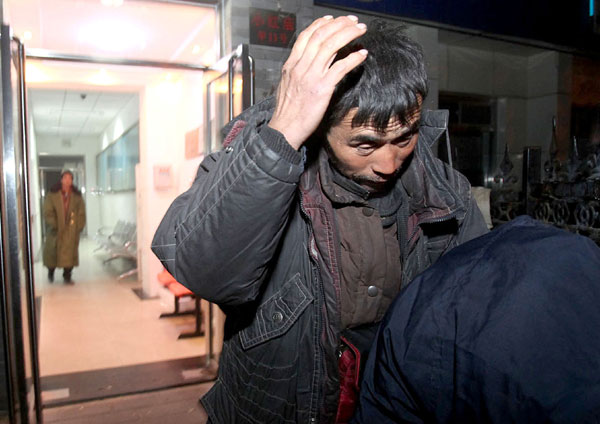Homeless find asylum at aid stations
Updated: 2011-12-05 08:10
By Wang Qingyun (China Daily)
|
|||||||||
BEIJING - Aid stations in Beijing are striving to keep the homeless people wandering around in the city warm in this freezing winter.
 |
|
A wanderer steps out of Beijing's Xicheng district aid station early on Saturday. He, with several others, will be sent to the Mentougou district aid station to avail of free accommodation offered by the municipal government. Wu Hailang / for China Daily |
"Twice in November the city's aid affairs management center urged us to actively help people in need," said Zhao Changlin, head of the aid station in Haidian district, which has helped more than 1,200 people this year.
The first notice came on Nov 1, when winter was about to set in, and the second on Nov 29, Zhao said.
He said the workers in aid centers in all 16 districts and counties of Beijing braced themselves to get into action as soon as they received the notice. In any case, he added, the aid station in Haidian was already conducting its own regular patrol, looking for those who might need their help.
Authorities of civil affairs, public security, urban management and health in Haidian district have formed a patrol team to look for and offer help to the needy in the district, Zhao said.
There are two to three such patrols each week in the district, he said. "If we get a notice from the city's aid affairs management center, we will add a temporary patrol."
The dropping temperature has led to more people turning to aid stations.
Xu Feng, a staff worker in the aid station of Shijingshan district, said the station has helped more than 200 people this year. The number of help seekers was slightly bigger than that in the preceding months.
According to the Mirror Evening News, aid stations in Beijing helped more than 50 people on Friday evening, the day the city saw the season's first snowfall.
"Of course we help more people in the winter," said Cao Yi, a staff worker with the aid station in Fengtai district.
Aid stations invite wanderers in and offer them boarding for free for several days. "If they don't want to stay in the station, we give them some clothes to keep warm. There are patrols in the district every week, and we also receive phone calls for help," said Cao.
Often aid workers take people in first, then check their identities, contact their families or their local government, and buy a train ticket to help them get back home in 10 days.
"They may not have an ID card. Nonetheless, we help them before checking their identities and contacting their families," said a staff worker surnamed Chen in the aid and consultation station in Dongcheng district.
"Usually we solve the problem in 10 days," said Zhao. "But we need to extend the period if the beneficiaries are not capable of looking after themselves, such as when they are mentally challenged or very old. We report such cases to the aid affairs management center."
According to the guidelines published by the Ministry of Civil Affairs to implement the State Council's order in 2003 in aid of the underprivileged, such as beggars and vagabonds, only those not included in the urban and rural social security networks can receive such aid. They would have to show their ID cards or other certificates to indicate their identity.
However, many "ineligible" people have received aid.
Zhao said more than 90 percent of the beneficiaries come to Beijing from all over China for different reasons. Some of them have failed to find a job here. Some of them came looking for their relatives but have run out of money. Some of them have lost their wallets.
"If we stick to the prescribed standard, only a few of them are eligible to receive aid," he said.











